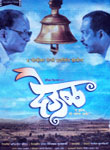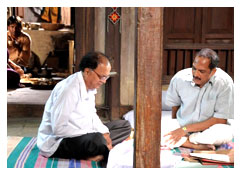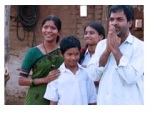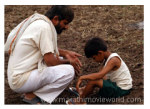Impressive ‘Deool’ ends without suitable climax
 |
Rating: na
Producer: Abhijit Gholap, Devisha Films Director: Umesh Vinayak Kulkarni Screenplay, Dialogues: Girish Kulkarni Music: Mangesh Dhakade Lyrics: Swanand Kirkire, Sudhir Moghe Cast: Dilip Prabhavalkar, Nana Patekar, Girish Kulkarni, Mohan Agashe, Atisha Naik, Sonali Kulkarni, Kishor Kadam, Jyoti Subhash, Hrishikesh Joshi, Vibhavari Deshpande Movie Review by: Ulhas Shirke |
After two sensible films ‘Valu’ and ‘Vihir’, the team of Umesh Kulkarni and Girish Kulkarni unite once again with their artistic work, through their latest released film ‘Deool’.
Besides perfect presentation of a village life supported by superb portrayal of characters by versatile artistes,’Deool’ successfully manages to depict the image of today’s rural India and the effect of globalisation on the lives of the people living there.
The film revolves around one such village Umbra in Maharashtra, which is otherwise peaceful and slow moving in progress, having been exploited by a local politician Bhau ( Nana Patekar), who is a tool at the hands of his party chief ( Mohan Agashe). Bhau cleverly manages the people from the village, including the lady Sarpanch (Atisha Naik) and proves how liberal he is, in treating the women folks. He also keeps his wife (Sonali Kulkarni) happy but sends his two daughters to Boarding school to keep them away from village life.
Bhau, respects the only educated and sensible senior citizen Anna( Dilip Prabhavalkar) , who lives all alone with his son and his family living in Bangaluru. When Anna comes up with a hospital project for the benefit of villagers, Bhau supports his idea and agrees to find finance through his party chief. In the meanwhile, a young labourer Keshav, working at Bhau’s house sees Lord Dattaguru in his dreams, while he takes a nap in the deserted place below a tree, after searching for his missing cow. When he wakes up, he is all excited and starts disclosing this miracle to whoever he comes across, on his way back home.
When Keshav narrates this incidence to Anna, he advises him not to disclose it to anyone and suggests him to keep his faith to his own self. But, the news spreads to the village and a Journalist who is a friend of the youths from the village including the nephew of Bhau, suggests them to sensationalize this matter. He convinces Bhau’s nephew and other friends the importance of this news and suggests them to turn this villlgae into a pilgrim centre. Bhau’s nephew goes one step ahead of his uncle and takes the Party chief into confidence. Bhau has no other way left but to take alongwith him the youth of the village and succumb to their demands. Fed up with this politics Anna decides to leave the village and moves to Bangaluru to join his son. Even Keshav desists himself from the materialistic living of the villagers, especially after the death of his cow.
The excellent realistic presentation of the film in the first half, manages to keep the audience engrossed into their daily life; but after interval slows down a bit with irrelevant scenes. It picks up after those breaks, only to conclude with unexpected climax, which is open ended for the audience to decide.

The most sensible person in this film- Anna deciding to quit the village, itself shows the helplessness of sensible people living in this country. The film had ample scope to show that there is law which does not spare those into corrupt practices, as suggested by the character of Anna to Bhau, in one of the scenes; but that does not happen in this film’s climax. There was also scope to show the villagers realising how important it was to have a Hospital project for their village, rather than playing with the sentiments of the devotees. But, that too does not happen in the climax.
The only young man Keshav does his best in his own way, but his efforts don’t bring the desired results. The film therefore does not succeed totally in removing blind faith, but only keeps the reality before the audience. There is no doubt that the selection of artistes for the respective characters is a perfect choice and so are the well written dialogues. Wonderful photography, perfect editing and best sound effect makes this film more presentable technically . Music by Magesh Dhakade is just appropriate for this film.
Direction of Umesh Kulkarni clearly shows, how perfect he has been with his study of village life.There has been lot of hard work during the film’s making, managing such a big team of talented artistes. Lead actor -Nana Patekar rocks in the role of Bhau; but it is Girish Kulkarni, who in the role of Keshav is more impressive. With excellent support coming from a big team of artistes, the film is more like a performance oriented film. Watch the expressions of Mohan Agashe, playing a shrewd politician, watch the body language of Usha Nadkarni, simple but perfect housewife played by Sonali Kulkarni and that guest apperance by Naseeruddin Shah, as a stranger coming to the village; they all are extraordinary!



